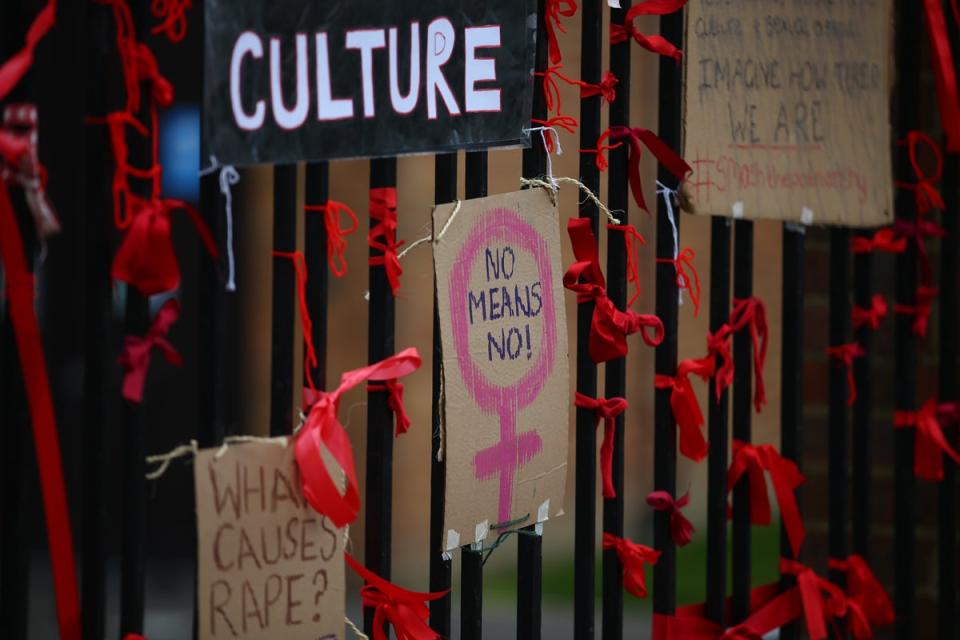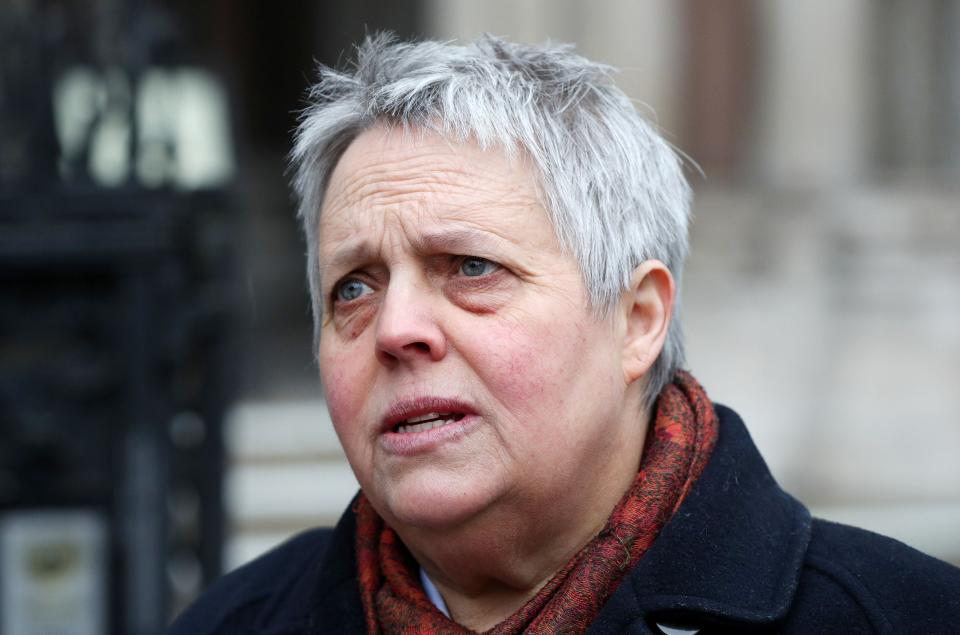‘We are deeply ashamed’: Government apologises to the thousands of rape victims who have ‘gone without justice’

Thousands of rape victims have been denied justice because of failings by police and prosecutors, the government has admitted.
Only 1.6 per cent of rapes recorded by the police are currently prosecuted in England and Wales – the lowest proportion for any crime.
The home secretary, justice secretary and attorney general said they were “deeply ashamed” of plummeting rape prosecutions after figures fell to record lows.
“The vast majority of victims do not see the crime against them charged and reach a court. One in two victims withdraw from rape investigations,” a joint statement said.
“These are trends of which we are deeply ashamed. Victims of rape are being failed. Thousands of victims have gone without justice.
“But this isn’t just about numbers – every instance involves a real person who has suffered a truly terrible crime.”
In 2019-20, 1,439 suspects were convicted for rape, the lowest level since records began, and down from almost 2,000 the previous year.
Following a two-year review of how rape prosecutions are handled through the criminal justice system, the government has unveiled a suite of reforms it says will increase the number of cases going to court.
But victims’ groups have hit out at “missed opportunities” and questioned whether the changes and funding behind them will be enough to effect significant change.
Amelia Handy, the policy lead for Rape Crisis, said it had taken part in an independent “shadow rape review” because of concerns over the government’s engagement with specialist groups.
“To our disappointment, very few of these recommendations have been taken up by the government,” she added. “This is a missed opportunity to create the fundamental changes required to make the system fit for purpose.
“While there are individual elements of the government’s report that are encouraging, it’s hard to identify any big commitments that will radically and swiftly improve the experience of the justice system for victims and survivors.”
The government’s plan aims to return to the volume of cases being referred to the CPS by police and charged before figures dropped off in 2016.
The Independent understands that if the government does not see the results that it expects, it could consider more radical changes.
Under the current plan, it will introduce “performance scorecards” on metrics including the speed of cases and engagement with victims.
Police forces are changing the way they demand victims’ mobile phones and some are trialling a “new approach to investigations”, where detectives place more emphasis on a suspect’s behaviour rather than placing “undue focus” on a victim’s credibility
In a foreword to the report, Priti Patel, Robert Buckland and Michael Ellis said the work aimed to “understand why we are letting down rape victims, and to right this wrong”.
They said they wanted to build victims’ confidence to report crimes to the police, ensure they are supported through the process and stop them dropping out of lengthy and intrusive investigations.
“We are not prepared to accept that rape is just ‘too difficult’ a crime to prosecute. We can, and must, do better,” the ministers added, calling for systematic and cultural change.
“This combined with updated and stronger case preparation methods, as well as increased communication between all those involved in the prosecution, should lead to more cases reaching court and more defendants pleading guilty.”
It follows a court battle over the causes of the steep decline in rape charges, where campaigners accused the Crown Prosecution Service (CPS) of selecting only safe cases for prosecution.
The CPS denied the claims and won the case, while a separate complaint on behalf of two rape victims resulted in changes to the way complainants’ phones and personal data are seized.
Statistics released by the Home Office last month showed that in 2020, 44 per cent of rape cases ended because victims did not support the prosecution, and 15 per cent because there were “evidential difficulties” even when a suspect had been identified.
Rape victims have previously told The Independent how “intrusive” investigations made them feel as though they, rather than their alleged attackers, were being put on trial.
The seizure of complainants’ mobile phones and long delays to court cases, which have worsened during the coronavirus pandemic, are also thought to have contributed to the drop-out rate.
The victims’ commissioner for England and Wales, Dame Vera Baird QC, said rape victims had been “comprehensively failed by the criminal justice system over the past five years”.
She praised ministers for voicing shame at the “abysmal record” but said their review presented some missed opportunities.
Dame Vera raised concern that the police investigation pilot had only been funded for one year’s rollout at this stage, and warned that the government had a “mountain to climb” to restore victims’ confidence.
Harriet Wistrich, founder and director of the Centre for Women’s Justice, said the CPS had been making “incomprehensible” decisions and become “risk-averse”.

“Whilst we are pleased that they have noted the appalling outcomes for the rape survivors in our dossier and acknowledged wholesale lack of confidence in the system, sadly there has been a failure to understand why the problem came about,” she added.
Andrea Simon, director of the End Violence Against Women Coalition, said the government had not backed innovative plans with sustainable funding.
“Transforming the response to rape cannot wait another two years for more trials and pilots to complete,” she said.
Victim Support questioned the use of 2016 levels as a government target, saying it “wrongly implies that it was a time when the justice system worked well for victims and survivors”.
Max Hill QC, the director of public prosecutions, said reversing the drop in charges was an “absolute priority for the CPS”.
He added: “This review presents an unprecedented opportunity across the whole criminal justice system, and I am determined to lead meaningful and lasting change in every aspect of how these cases are handled, in partnership with the police and the courts.”
The National Police Chiefs’ Council acknowledged that “too few victims are getting justice” and said change was already underway.
The national lead for rape cases, Deputy Chief Constable Sarah Crew, said: “Police officers join to take dangerous people off the streets and get victims the justice they deserve but, in the case of rape, that has not happened enough. This is incredibly frustrating for all of us and we are absolutely committed to doing better.”
Read More
Police and prosecutors must focus on actions of alleged rapists not victims, new guidance says
CPS vows to increase prosecutions for violence against women
Women’s groups lose legal battle over plummeting rape prosecutions at Court of Appeal
Rape victims need answers over plummeting prosecutions as authorities trade blame
Police demanded rape victim's phone and medical records despite identifying attacker by DNA

 Yahoo Finance
Yahoo Finance 